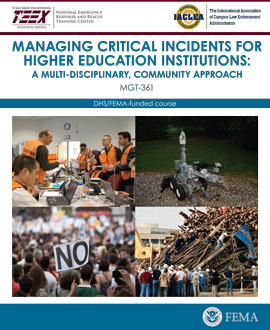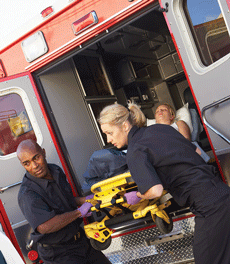College campuses call on TEEX for training in managing critical incidents
COLLEGE STATION – Recent shootings on college campuses in Oregon, Arizona and Texas are just the latest of more than 20 incidents on campuses in the United States this year. And it adds to the worries of campus administrators, law enforcement officers and the communities around them, not to mention students and parents.


TEEX Training Coordinator Jeff Stine and Instructor David Heffer recently returned from conducting the 24-hour training program in Blacksburg, VA, where the deadliest shooting on a U.S. college campus occurred in 2007. A guest speaker at the class was Police Chief Kevin Foust of Virginia Tech, a former FBI special agent who responded to the 2007 shooting on the campus in Blacksburg.
The class included a mix of university and college deans, law enforcement officials from police and sheriff’s departments, emergency managers, and even a representative from Virginia’s Chief Medical Examiner’s Office, Stine said.
“We have gotten a lot of requests for the class over the past couple of weeks,” Stine said. The TEEX course is unique in that it is designed for the “boots on the ground” as well as emergency managers and university officials, he added.
 TEEX collaborated with the International Association of Campus Law Enforcement Administrators (IACLEA) to develop the course about five years ago, and jointly delivered the training until the initial funding ended. Seeing an ongoing need for the course, TEEX requested approval to continue delivering the training with funds received through the Homeland Security National Training Program Cooperative Agreement. Nearly 500 people have completed the class since December 2013.
TEEX collaborated with the International Association of Campus Law Enforcement Administrators (IACLEA) to develop the course about five years ago, and jointly delivered the training until the initial funding ended. Seeing an ongoing need for the course, TEEX requested approval to continue delivering the training with funds received through the Homeland Security National Training Program Cooperative Agreement. Nearly 500 people have completed the class since December 2013.
“Our goal is to integrate the community with the university and local law enforcement,” Stine said. “We often bring together people who have never trained together or planned together, but they will have to work with each other if an incident occurs. For example, plans often overlook housekeeping and maintenance staff, but everyone has a role to play.


Participants in the course run through several scenarios that incorporate past campus incidents, both manmade and technological. “We talk about all phases from preparedness to recovery to response — everyone has a part to play,” Stine said.
The course is offered at no charge through TEEX’s National Emergency Response and Rescue Training Center, and is typically hosted by a college or university. Upcoming classes are scheduled at South Dakota State University, Fitchburg State University, Texas Southern University, Moreno Valley College and Tennessee State University.
Learn more about this and other TEEX Campus Safety Programs.
MEDIA CONTACTS:
Brian Blake, TEEX Communications Director
[email protected]
PH: 979-458-6837, Cell: 979-324-8995
Will Welch
[email protected]
PH: 979-458-6979, Cell: 979-220-2840
